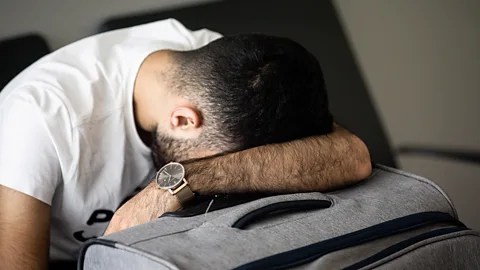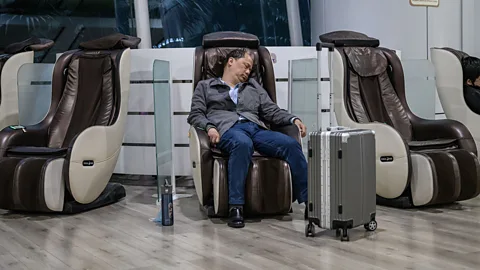By Sandy OngFeatures correspondent

 Getty Images
Getty ImagesFor some people, no matter how much sleep they get, they still feel tired and low in energy. Why?
On most days, I'm a stickler for routine, especially when it comes to sleep. I get ready for bed well before I begin to feel tired: changing into my pyjamas, cleaning my teeth, and doing an overly elaborate skin care routine. I leave my phone in the dining room where it stays overnight, then retire to my bedroom – one that's quiet, dimly-lit, and of perfect Goldilocks temperature – to scribble briefly in my gratitude journal. A half-hour of fiction reading follows, before turning the lights out at roughly 11pm.
Eight-and-a-half hours later, my alarm rings and I wake up feeling…tired. I am early mid-life, exercise regularly, and am, as far as I know, healthy (knock on wood). Why, then, does being bright-eyed and bushy-tailed elude me most mornings, despite sufficient sleep?
It turns out I'm far from alone. According to a 2023 meta-analysis that examined 91 studies across three continents, one in every five adults worldwide experienced general fatigue lasting up to six months, despite having no underlying medical conditions. In the US, 44% of the more than 1,000 adults surveyed by the National Sleep Foundation in 2019 said they felt sleepy between two to four days every week. While a 2022 YouGov poll of nearly 1,700 people found that one in eight UK adults were tired "all the time", with another quarter knackered "most of the time". Women were more likely to be fatigued than men, regardless of whether they had children or not — a finding that was echoed across multiple studies.
A fuzzy concept
Tiredness is "a very, very common" complaint among the patients, says Rosalind Adam, a family physician who has been practising in Aberdeen, Scotland, for more than a decade. The condition is so frequent that the National Health Service even has its own acronym for it: TATT (Tired All The Time).
But for all this ubiquity, scientists' understanding of fatigue – what causes it, how it changes our bodies and brains, as well as how best to treat it – is incredibly limited. Even pinning down a definition has been tricky. Tiredness is different from sleepiness, which is "more a propensity to fall asleep", explains Adam. "The two are interrelated, of course, but fatigue is much more multidimensional," she says.

 Getty Images
Getty Images"It's sort of a catch-all concept of feeling tired," says Christopher Barnes, professor of organisational behaviour and management at the University of Washington in Seattle, who studies how sleep deprivation affects the workplace. "And there's lots of ways that we can feel tired."
There's physical fatigue, for instance, the kind you might feel after a long hike or a particularly strenuous session in the gym. "That's normal physiological fatigue," explains Vicky Whittemore, a program director at the National Institutes of Health in Bethesda, Maryland, who studies the biology of fatigue. "It's easy to understand and people have been studying muscle fatigue for a long time."
But fatigue can also encompass a cognitive and emotional aspect – which explains why when we're tired, we might experience brain fog, find it a slog to get things done, or snap at those around us. It's only in the past decade that scientists have been able to dig deeper into these other facets of fatigue, thanks to advances in imaging technology and biochemical assays that allow us to study real-time changes in the brain, says Whittemore. "We're really just beginning to understand the neurobiology now and what parts of the brain are perceiving fatigue."
Another challenge is that fatigue is incredibly subjective, and it can arise for myriad reasons. It's a symptom of many diseases and chronic conditions, including cancer, multiple sclerosis, long Covid, depression, and myalgic encephalomyelitis. However, it can also have much less serious causes. "It's absolutely important to distinguish between illness and non-illness-related tiredness," says Adam, who also teaches at the University of Aberdeen, where she is leading an ongoing study examining how fatigue impacts individuals with myeloma, heart failure, and long Covid.
"I think if we can unpick different types of fatigue, we might be able to treat them differently and offer more tailored solutions," says Adam.
Quality over quantity
The benefits of getting sufficient sleep – the amount that adults need varies, but most people need seven or more hours a night, and experts recommend getting between seven and nine hours – have been extolled upon us time and again. Without this downtime, our bodies wouldn't be able to repair muscles, boost immunity, regulate emotions, consolidate memories and new information, among other critical functions. People who are fatigued for prolonged periods have a higher risk of death than the general population, as well as a higher risk of anxiety and depression.
On a daily basis, getting inadequate rest can result in headaches and other bodily pains, as well as cause feelings of irritability, low mood, and an unfocused mental state. These effects often spill over to our relationships. "We know from the literature on sleep and marital satisfaction that when one person in a marriage is sleep deprived, there's more conflict in that couple," says Barnes.
Fatigue can also adversely affect the workplace, with repercussions on both performance and leadership. Barnes was the first to examine how sleep-deprived bosses are more likely to mistreat their employees through hostile verbal and non-verbal behaviour: "They go into work with less self-control and they're more likely to engage in what we call ‘abusive supervision'," he says. (Read more from BBC Future about why burnout happens and what to do about it.)
Worse still, fatigue can have devastating outcomes — in the UK, tiredness is the root cause of 20% of all accidents on major roads. Human error linked to fatigue or sleep loss has also been implicated, along with other factors, in numerous man-made disasters, including the Challenger Space Shuttle accident and the Exxon Valdez oil spill. "Fatigue in oil and gas [extraction], both onshore and offshore, has resulted in significant catastrophes, the loss of lives, economic issues, and environmental issues that we still suffer from," says Ranjana Mehta, a professor of industrial and systems engineering at the University of Wisconsin-Madison, Madison, who studies occupational fatigue.
But getting sufficient shuteye is only one part of the equation. Quality matters too, if not more. "Getting fewer hours of solid sleep is better than more hours of sleep, but interrupted sleep," says Whittemore. "You feel much less refreshed if you have interrupted sleep."
That's partly because when we sleep, our brains power down extraneous processes. The resting neurons create space for cerebrospinal fluid, which usually surrounds the brain, to flood in and clear out accumulated debris, such as the sticky beta-amyloid plaques that are usually associated with Alzheimer's disease. It's a sort of waste-clearance system scientists call the glymphatic system. "If you have disrupted or dysfunctional sleep, it disrupts that whole balance," says Whittemore. "So there aren't as many toxins being cleared from your brain."
Interestingly, our glymphatic systems work best at the same time every day, says Daniel Jin Blum, a sleep psychologist and research assistant professor at New York University Shanghai. "So if you get the same amount of deep sleep at your regular time versus shifted eight hours later, the ability to flush out toxins is significantly compromised."

 Getty Images
Getty ImagesThis means that when we get our shuteye is important. Syncing sleep with our natural circadian rhythms – the brain's 24-hour internal clock that regulates the cycle of alertness and sleepiness – gives rise to the best-quality rest. This explains why shift work is often associated with poor health outcomes, ranging from heartburn to diabetes.
"Among other things, if you get that same eight hours of sleep, but not during the regular circadian period, you get almost no REM sleep and you're not really reaping the benefits," says Blum, referring to the fourth and final stage of our sleep cycle that's characterised by rapid eye movements, where we typically dream, strengthen neural connections, and process emotions from the day. Too little or dysregulated REM sleep has been linked with depression, dementia, Parkinson's disease, and other cognitive issues.
Myriad reasons
Given the pervasive effects of poor-quality sleep on our health, relationships, and work, it's important to try and unearth the root of all this misery. When patients complain of persistent fatigue, the first thing Adam does is rule out any medical causes.
Blood tests can sometimes be useful in pinpointing thyroid disorders or an imbalance of oestrogen and other hormones – conditions that are frequently linked with feelings of fatigue, especially in women.
Tests can also reveal if you're lacking certain nutrients like vitamin B12, folate, and D; or minerals such as iron and magnesium. "Nutrient deficiency plays a substantial role in contributing to fatigue," says Geir Bjørklund, who founded the Norwegian nonprofit Council for Nutritional and Environmental Medicine. "Essential nutrients, including vitamins, minerals, and dietary components, are crucial for various physiological processes, including energy metabolism," he says.

 Getty Images
Getty ImagesBut blood tests only go so far. "They show up normal in 90% of the cases we see in primary care," says Adam, "which is why taking a comprehensive clinical history is key".
"In healthy individuals, we look at contributing roles of things like exercise, sleep, diet, mental health. It's really about looking at that individual and the factors that might be important to them," says Adam. For instance, a person may have young children, which may make uninterrupted sleep a far-off luxury.
Stress, in particular, is a big contributor to fatigue. Tellingly, a 2022 study of more than 16,200 government employees in China found that those who experienced negative stressful life events at baseline were twice as likely to report feeling fatigued at follow-up.
When we're stressed, our bodies produce a hormone called cortisol, which in turn raises our body temperature and heart rate to gear us up to face a threat. Cortisol levels fluctuate naturally throughout the day, but when they remain elevated, it's harder to fall asleep and stay asleep. It's that "tired but wired" feeling, says Whittemore.
Another really common cause of fatigue in otherwise healthy people is sleep disorders or breathing issues, says Blum.
This includes snoring, which occurs when one's airway is partially or fully blocked. "All snoring is abnormal, and may be a sign of sleep apnoea," he says, referring to the disorder that causes some sleepers to stop and start breathing repeatedly throughout the night.
All this can disrupt natural sleep patterns and make deep sleep elusive, says Blum. "So people get that seven to nine hours of sleep, but it's insufficient quality."
Dehydration is another major cause of fatigue. Other typical culprits include caffeine and alcohol. "I think most people underestimate how much they impact the quality of their sleep," he says. "Caffeine, for instance, has a half-life of roughly five hours, which means even when you have a cup of coffee at noon, a quarter of that caffeine will remain at midnight."
Alcohol, especially close to bedtime, can also negatively affect sleep quality in many ways: aggravating breathing problems, disrupting the circadian cycle, and blocking REM sleep. "Oftentimes you will fall asleep maybe a little faster during that first sleep cycle and get a little more deep-sleep," explains Blum. "But after that, it just kind of bounces us around our lightest stage of sleep, causing more awakening and additional cortisol spikes overnight."
At the end of the day, Bjørklund explains that the tips for boosting energy are mostly what our rational minds already know: "Embrace a balanced diet, address nutrient deficiencies, maintain good sleep hygiene, manage stress through techniques like mindfulness, engage in regular physical activity, ensure proper hydration, consider therapeutic interventional like cognitive behaviour therapy, and build a support network."
Implementing those techniques, of course, is another matter entirely. It looks like a rework of my routine is in order.
--
If you liked this story, sign up for The Essential List newsletter – a handpicked selection of features, videos and can't-miss news delivered to your inbox every Friday.
Join one million Future fans by liking us on Facebook, or follow us on Twitter or Instagram.
"some" - Google News
January 25, 2024 at 09:00PM
https://ift.tt/DBJOGQo
Why do some people feel tired all the time? - BBC.com
"some" - Google News
https://ift.tt/3rasBJP
Shoes Man Tutorial
Pos News Update
Meme Update
Korean Entertainment News
Japan News Update
Bagikan Berita Ini














0 Response to "Why do some people feel tired all the time? - BBC.com"
Post a Comment